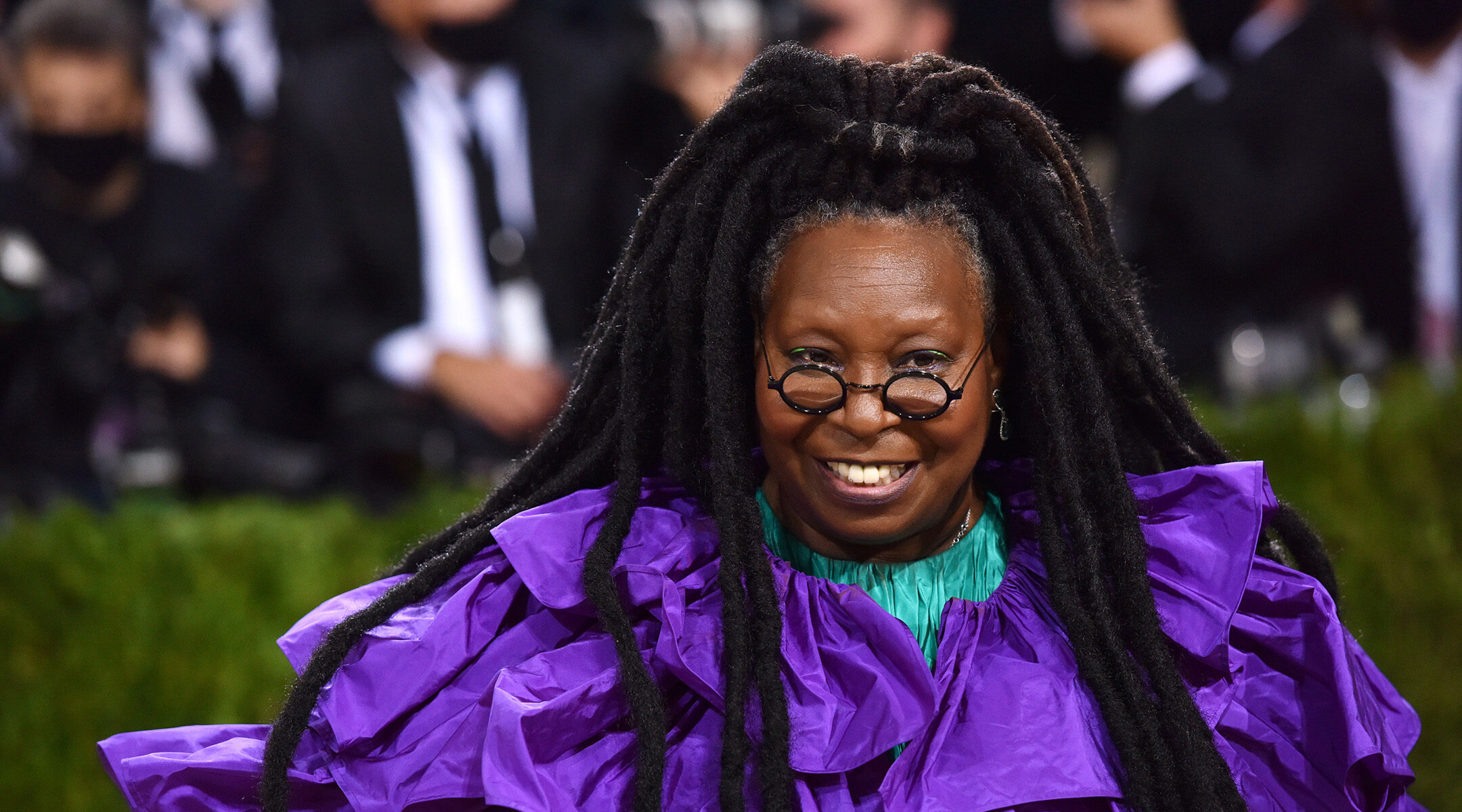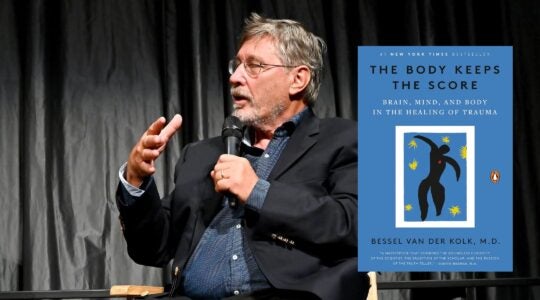(JTA) — She may not have meant to, but this week Whoopi Goldberg waded into a charged discourse that has polarized the Jewish community — and those who seek to discriminate against them — for centuries.
The controversy began brewing on “The View,” the daytime talk show she co-hosts, during a discussion Monday over the recent controversy over a Tennessee school board’s decision to ban “Maus,” the iconic graphic memoir about the Holocaust. The genocide was “not about race,” she said, it was instead about “man’s inhumanity to man.” And it involved “two white groups of people.”
The comments immediately went viral and struck a nerve, leading to what Goldberg described as a deluge of accusations of antisemitism and Holocaust denial, and criticism from groups like the Anti-Defamation League.
Despite multiple apologies, the storm reached a climax on Tuesday night when ABC decided to suspend Goldberg from “The View” for two weeks “to take time to reflect and learn about the impact of her comments,” in the words of ABC News President Kim Godwin. Jews across the political spectrum, included many who objected to her original remarks, criticized the decision to suspend her.
Why did the comments create such a firestorm? The answer extends well beyond the Holocaust.
Was the Holocaust ‘about race’?
After her initial comments circulated, Goldberg went on “The Late Show with Stephen Colbert” on Monday and attempted to clarify the situation. In doing so, she dug deeper into the race issue.
In her experience as a Black person, she said, race is something “I can see.”
“If the [Ku Klux] Klan is coming down the street with a Jewish friend…I’m gonna run. But if my friend decides not to run, they’ll get passed by most times, because you can’t tell who’s Jewish,” she said. “It’s not something that people say, ‘Oh, that person is Jewish.’”
“Race” is notoriously difficult to define. Is it, like Goldberg claimed, a group of people with shared physical characteristics? Can other social, economic and anthropological classifications factor in?
Jews have long debated whether they are a “race” or something else. Judaism is a religion, practiced by people of all varieties and races across the globe. But Jews do not have to be practitioners to regard themselves or be accepted by other Jews as Jews. The Jewish tradition of “matrilineality” — defining as Jewish a child born of a Jewish mother — points to a biological definition of Jewish identity. But Judaism also accepts converts.
Taken all together, these various understandings have led Jews to regard themselves (and others to regard Jews) variously as a people, a nation, a tribe, a family and a faith — sometimes in various combinations, sometimes all at the same time.
But Hitler, like many antisemites before him, specifically — and repeatedly, in writings and laws and speeches — labeled Jews as a physically impure Slavic-descended race, in contrast to what he termed the blonde, blue-eyed genetically pure German Aryan race. Nazi propaganda promoted pseudoscientific ways to supposedly identify Jews — by the size of their nose and lips, or the shape of their heads, among other things.
Hitler was obsessed by what he considered the biological fact of Jewish identity, and wrote that the “Final Solution” was inspired in part by his drive to create a more “pure” and singular human race, rid of “Jewish” and other impurities.
The Nazis drew on a tradition of “racially” stereotyping Jews that scholars have traced at least to 1000 CE. The long, hooked nosed trope, for example, appeared in everything from medieval paintings to fictional characters, like the villain Shylock from Shakespeare’s “The Merchant of Venice.” So the Jews were persecuted as a “race” by their neighbors in Europe and elsewhere for centuries before Hitler outlined many of his ideas in “Mein Kampf” in a jail cell in 1925.
In her next-day apology on “The View” on Tuesday, Goldberg said the Holocaust “is indeed about race because Hitler and the Nazis considered Jews to be an inferior race.”
Are Jews white?
Goldberg also stumbled into an ongoing debate within and beyond the Jewish community: Are Jews “white people”?
Behind the question is another stereotype — that a Jew is a person with white skin, descended from European ancestors. In other words, an average Ashkenazi Jew.
In reality, the Jewish community is considerably more diverse than that. The majority of Jews in North America may be Ashkenazi Jews with roots in Eastern Europe, but Jews also descend from ancient communities in Ethiopia, India, China and beyond. Sephardic Jews come from communities in Northern Africa and what is now Spain and Portugal, while Mizrahi Jews come from the Middle East, including once vital communities in Iraq, Iran, Yemen, Syria and other countries.
Consciousness of that diversity has grown in part thanks to the advocacy of Jews of color in this country and Sephardic and Mizrahi Jews in Israel. Thousands of Jews come from mixed-race and interfaith backgrounds, so even many Jews with Ashkenazi roots are not white.Estimates of the proportion of U.S. Jews who are Jews of color range from 6% to 15% depending on the study and definition, and the Jews of Color Initiative argued in 2019 that the community has been chronically undercounted because of poor study designs. (Last year’s Pew Research Center report about U.S. Jews concluded that 92% of Jews identify as white.)
Add on people from all types of racial and ethnic backgrounds who convert to Judaism, those who practice Jewish traditions without having undergone formal conversions and people around the world who strongly identify with some aspects of Jewish culture, and “Jew” quickly becomes an extremely hard-to-define term.
The Atlantic’s Yair Rosenberg argued on Tuesday that “family” is a more accurate way than “race” to encapsulate the community.
In my experience, mistakes like [Goldberg’s] often happen because well-meaning people have trouble fitting Jews into their usual boxes. They don’t know how to define Jews, and so they resort to their own frames of reference, like “race” or “religion,” and project them onto the Jewish experience. But Jewish identity doesn’t conform to Western categories, despite centuries of attempts by society to shoehorn it in. This makes sense, because Judaism predates Western categories. It’s not quite a religion, because one can be Jewish regardless of observance or specific belief. (Einstein, for example, was proudly Jewish but not religiously observant.) But it’s also not quite a race, because people can convert in! It’s not merely a culture or an ethnicity, because that leaves out all the religious components.
Still, even as more recognize Jewish diversity, stereotypes persist. White supremacist, hypernationalist and other far right streams, stemming from the post-2016 rise of the “alt-right,” see Jews as toxic “others,” regardless of what they believe or practice. And on the other end of the political spectrum, some left-wing progressives lump all Jews in with a largely white oppressor class.
With that last name, is Whoopi Jewish?
The extra thick layer of irony underlining this controversy is that it involves a celebrity who was not born Jewish, but who adopted a Jewish stage name because of what she has described as her positive feelings toward Jews and Jewish culture, not for religious reasons.
The EGOT winner — one of very few performers to have won an Emmy, Grammy, Oscar and Tony — was born Caryn Elaine Johnson in New York City to a Baptist clergyman father and a nurse mother. In 1994, her publicist told the Orlando Sentinel that her stage name Goldberg came from her mother’s side of the family (her first name is a nod to the whoopee cushion). But DNA tests and family trees constructed by the likes of Henry Louis Gates, Jr. trace her lineage back to non-Jewish roots in West Africa.
Nevertheless, in her words, she “feels” Jewish. She told the London Jewish Chronicle in 2016 that she “remembers” Jewish holidays, even if she is not regularly observant in any way. When people would ask if she were Jewish, Goldberg said she had a standard reply: “I always say ‘Would you ask me that if I was white? I bet not,’” Goldberg told the Chronicle. “The name is wonderful for starting conversations.”
Mission accomplished.
Why does any of this matter?
The Holocaust has stamped its legacy on nearly every Jew who has lived and been born in the 77 years since the liberation of Auschwitz. Because so many antisemites and European ultra-nationalists are intent on denying that the genocide happened, or insist that it has been exaggerated, Jewish groups are adamant that the facts of history not be distorted, intentionally or not. Such “accidental” distortion, many argue, can be antisemitic in effect, even if not in intent.
Others suggest that Goldberg’s comments reflect an emerging ideology that is trying to downplay the historic persecution of the Jews. As Daniella Greenbaum, a former producer at “The View,” wrote in The Washington Post on Wednesday, “It’s an ideology that tries to turn Jews into White people, that tries to erase Jewish vulnerability and oppression, to squeeze Jews who have light skin into modern American categories of race and ethnicity, and which also myopically categorizes the hatred against them into American considerations of what racism looks like.”
And yet many prominent Jews were willing to give Goldberg, if not a pass, then a second or third chance, especially in the name of using the controversy as a teachable moment.
As Rabbi Sharon Brous of the Ikar community in Los Angeles tweeted, “If what you want is to change someone’s mind, I have to think education is more effective than public shaming and punishment. Particularly when that person shows a sincere willingness to learn and apologize.”
JTA has documented Jewish history in real-time for over a century. Keep our journalism strong by joining us in supporting independent, award-winning reporting.






